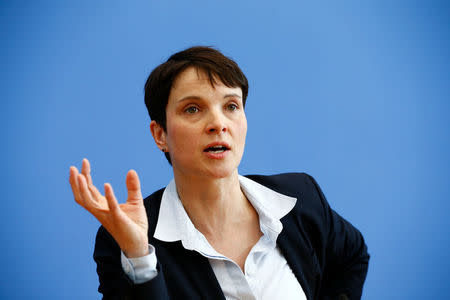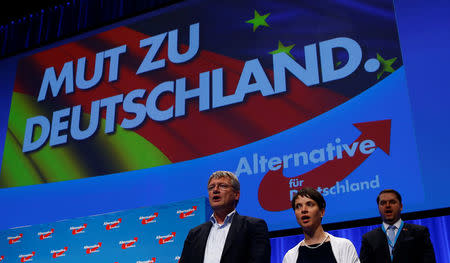AfD's Petry quits German election race, may boost mainstream parties
By Michelle Martin BERLIN (Reuters) - Frauke Petry, co-leader of the Alternative for Germany (AfD), said on Wednesday she would not lead the anti-immigration party's campaign for a Sept. 24 federal election - a surprising move that could play into the hands of established parties. The shock decision by Petry, the face of the AfD, removes her from the very top of a party that has hurt Angela Merkel's conservatives in regional votes but which may now pose less of a threat to the chancellor's bid for a fourth term in office. Petry's announcement came after she caused controversy by tabling a motion for a congress next weekend in which she said the AfD - which is shunned by other parties - should be ready to join coalitions in future. She said some other senior AfD members like Alexander Gauland, however, wanted it to be a "fundamental" opposition party. Speaking in a video message posted on her Facebook page, Petry denied suggestions that she had made the proposal with a view to becoming the party's top candidate. "In order to put an end to all speculation in this regard, I am using the opportunity of this video message to clearly state that I am neither available for a lone lead candidacy nor for participation in a top team," she said. Opinion polls show the AfD winning enough votes to enter the Bundestag lower house of parliament for the first time after September's election. But the party has lost about a third of its supporters since late last year, hit by a slowdown in migrant arrivals, AfD infighting and controversy over its attitude to the Nazi past. Petry said she had decided not to run as it was important for the AfD to discuss issues such as her proposal on the party's future strategy - which the majority of regional AfD branches oppose - without being hindered by personnel questions. OTHER PARTIES TO GAIN? Thomas Jaeger, a political scientist at Cologne University, said it would be hard for anyone else to rival Petry in terms of public profile, forcing whoever takes up the leadership role to take tough positions to get the same attention she has enjoyed. Petry is a 41-year-old chemist from the former Communist East Germany and is expecting her fifth child. A far right-wing candidate would probably still manage to lead the AfD into parliament but would deter some voters, said Jaeger. "All those (parties) who lost some points - and that's actually all of them - will regain some percentage points, albeit to differing extents," he said. The AfD, which rails against Merkel's decision to allow more than a million migrants into Germany since mid-2015, is due to decide on its election leadership line-up at a weekend gathering in Cologne, where tens of thousands of protesters are expected. Petry's camp wants to expel from the party a senior member, Bjoern Hoecke, for calling Berlin's Holocaust Memorial a "monument of shame" and saying history books should be re-written to focus more on German victims of the Nazis. Petry managed to secure a two-thirds majority on the party executive board in favour of expelling Hoecke. However, the far-right wing of the AfD supports him and a party arbitration board must now decide his fate. A Forsa opinion poll published on Wednesday showed the AfD winning eight percent in the election, well above the five percent threshold needed to win seats in the Bundestag. Merkel's conservatives are seen remaining the largest party bloc. Germany's Der Spiegel magazine has reported that Petry's opponents agreed at a secret meeting last week to form a team around Gauland, a 76-year-old publicist, and 38-year-old economist Alice Weidel - who, like Petry, wants Hoecke ousted. The AfD could not be reached for comment on the report. (Additional reporting by Hans-Edzard Busemann and Paul Carrel; Writing by Michelle Martin; Editing by Madeline Chambers and Gareth Jones)

 Yahoo News
Yahoo News 



